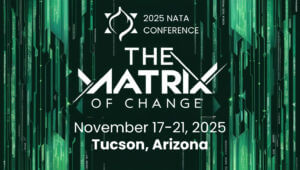Presenter Proposals
We are no longer accepting presenter submissions. Thank you to everyone who submitted a workshop proposal!
3/5/2025
Proposal Form Opens
4/30/2025
Proposal Deadline
5/30/2025
Presenters Notified
10/31/2025
Materials Due
11/17-11/20/2025
Present at the NATA Conference!
Questions?
Contact the Conference Education Co-Chairs:
or, NATA Staff:
Theme
For the 2025 Annual NATA Conference, our planning team has chosen the theme of
‘The Matrix of Change’.
In the spirit of the Matrix movies, where characters navigate complex realities and transformative journeys, we invite you to submit a presentation for NATA CON 2025. "The Matrix of Change," reflects the dynamic and evolving landscape we face in our synagogue communities. Just as Neo and his allies confront and adapt to new challenges, we too must prepare for shifts in environmental factors, membership, engagement, and staffing models; especially in an era of remote work. We are seeking presenters and speakers who can guide us through this Matrix; ones who are offering insights and strategies to effectively manage and implement transformation within our synagogues. Together, let's explore how to embrace change and lead our communities into a vibrant future.
Please prepare your submission to include how your workshop topic or area of expertise might fit into the overall themes of the conference as described below. Contact the Conference Education Co-Chairs Sarabeth Levine and Scott Nelson if you have questions or need more guidance.
Navigating Organizational Transformation
"You have to let it all go, Neo. Fear, doubt, and disbelief. Free your mind." – Morpheus
Change requires action, not just awareness.
Discuss strategies for managing change; including leadership approaches, communication techniques, and fostering a culture that embraces change.
Technology Integration and Innovation
"I can only show you the door. You're the one that has to walk through it." – Morpheus
Transformation is a personal choice.
Explore how to leverage technology to enhance community engagement, streamline operations, and support religious practices. This could include case studies of successful implementations and future trends.
Sustaining Community and Tradition Amidst Change
"There is a difference between knowing the path and walking the path." – Morpheus
Engage in the process.
Address the balance between maintaining traditional values and practices while adapting to modern needs and expectations. This could involve discussions on intergenerational engagement, preserving cultural heritage, and innovative programming.
For maximum fun and attendee engagement, we encourage you to incorporate creative use of The Matrix movie references in your workshop titles and/or descriptions!
About the Review & Selection Process
Process
NATA strives to be inclusive and diverse when reviewing session proposals. Our process combines the collective input of peers, volunteer leaders, and professional staff to ensure that our members have a significant voice in co-creating the conference programming. Together, members and staff ensure that program content is timely, relevant, and targeted to attendee needs.
All proposals go through an initial blind review process, where they are evaluated anonymously by the Conference Education Committee (CEC) members based on the rating criteria below. Proposals that meet a pre-determined average score then move forward to the next round of the selection process.
The CEC is comprised of NATA member volunteers and includes NATA staff. During the second round of review, the CEC further assesses the proposals to make recommendations for inclusion in the annual conference. At this stage the speaker's information is revealed and becomes a part of the evaluation process.
Evaluation Criteria
The CEC considers the following criteria when evaluating submitted proposals:
- Aligns with NATA's mission and vision.
- Fits within the theme of the conference as outlined in this Call for Presenters (CFP).
- Provides educational value to NATA members.
- Incorporates interactive learning formats and experiences.
- Includes lasting strategies that can be implemented at participants’ home congregations.
- It is expected to generate strong interest and engagement from attendees.
- Demonstrates innovation and uniqueness in content and/or design.
